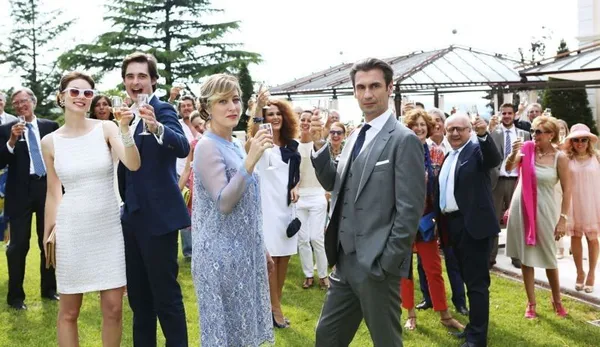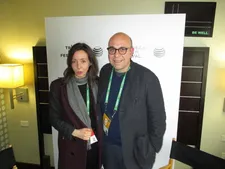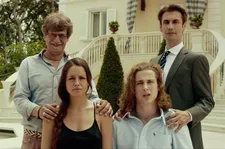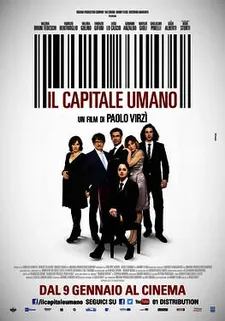 |
| Paolo Virzi on Human Capital: "Money knows no borders." |
When I spoke with Paolo Virzì the day before the Tribeca Film Festival US premiere of his film Human Capital (Il Capitale Umano) we discussed Alexander Payne with a touch of Como, George Clooney's clothes in The Descendants, François Truffaut's La Peau Douce, guilt, his choice of music from Amy Winehouse to Vivaldi and the impact a sweet and sour Frank Sinatra Christmas rendition can have.
Valeria Bruni Tedeschi as Carla and Valeria Golino as Roberta give brilliant performances entangled in the web of what is perhaps the most revolting selection of male characters in a film I have seen at least this year. Fabrizio Gifuni and Fabrizio Bentivoglio play two of the men in their lives.
 |
| Human Capital director Paolo Virzì with Anne-Katrin Titze on globalization: "We seem like each other more than before." Photo: Will Carrington |
On an evening right before Christmas in Northern Italy, a waiter at a school function is run over on his bicycle riding home in the snow. This hit and run tragedy links a number of people from different social backgrounds as Virzì's delicate and bewildering tale jumps back and forth from a summer past to the fateful winter night.
Anne-Katrin Titze: I saw your film this morning and I loved the opening shot of the decorated tables from above. They look like cupcakes.
Paolo Virzì: The party's over!
AKT: Yes. The sprinkles are cleared away. The cakes will be gone. Next you show the projected snowflakes on the building. These strong visual markers are for us to get a sense of time? Your film jumps back and forth a lot when the story is told from three perspectives. We go back to the same place with the snow flakes - was that the idea?
PV: Yes, of course. It was easier for the audience to recognise the same place at first glance. And you picked up a sense of the first shot which was exactly the kind of description that the party is over. It is also a metaphoric statement - the richness, the system of value behind the world of the wealthy, of the power, of the money. The competition behind this world. Probably this movie is a kind of de profundis, we say in Latin, a eulogy of a world.
 |
| Paolo Virzi on costume designer Bettina Pontiggia: "This comes really from a true observation of the reality of our middle class." |
AKT: Which world, though? It seems at the end, one of the worlds is still thriving. The rich pull through, no?
PV: Ah, yes. But they are completely desperate and unhappy. When Carla looks at herself in the mirror at the end we have the feeling that she is involved in what is a kind of trap for her. It's like being in a grave. She is like a person who covered the truth of her life, which would be different. She wanted to be an actress, she wanted to be somebody who tried to make beautiful things for the audience or the community. In the end she is involved with something that she hates. She is a victim and at the same time she has a responsibility, she shares the same responsibility of her world. Probably we can find something mysterious and alive in the glance exchanged by the two adolescents at the very last scene. But they are in a prison.
AKT: You end with two kinds of prison.
PV: I think there is no innocence in this story. There are lots of victims. The who-done-it of the plot is that everybody is guilty. The real victim is also the main guilty. Because the guy who bumped him with car is an innocent guy.
AKT: He is an innocent guy?
PV: I mean in his life, yes. But not in the story.
AKT: I like that you leave Dino (Fabrizio Bentivoglio) and his wife [Roberta] and the pregnancy aside at the end. You are making a statement by showing two prisons but not the third. They, the middle class suburbans are abandoned by the audience. I want to talk to you about the costumes and the very telling details you chose. How precise you are with types - Dino's orange watch and floral scarf, for example.
 |
| "She has nothing in common with the guy she is in a relationship with." |
PV: This comes really from a true observation of the reality of our middle class. The middle class, especially in a small town of the north, like the one we were telling about. With the costume designer Bettina Pontiggia we did a kind of scouting and we went to the aperitivo time, the happy hour, of the bars in the center of Varese, for example, or Como, which are the cities where the movie is located. The movie is located in a kind of emblematic, imaginary place called Ornate Brianza which doesn't exist in reality. We made a kind of patchwork. We used Varese, Como and Brianza, which is an area around Milano and Pavia.
AKT: It's funny that you mention Como. I was actually thinking of George Clooney's costumes in Alexander Payne's The Descendants. Costume designer Wendy Chuck told me about a similar scouting in Hawaii and the result is equally brilliant and real.
PV: I really like Alexander Payne because he has the courage to put the pathetic into the tragedy. I like to mix this. You know, with my previous movies, I made a lot of bitter comedies, let's say. This is the darkest movie I ever made so far. This is my eleventh or twelfth. In my previous movies I tried to pick up painful stories, painful plot and transform them into comedies. This time, I was charmed by this American novel [Human Capital by Stephen Amidon] which seemed to me to have something that was regarding our moment in time. In the eve of the globalisation of the economy, the globalisation of the behaviors of the characters - the world is smaller. We seem like each other more than before.
AKT: The problems are very relatable. It's not an Italian problem you are showing.
PV: Money knows no borders.
 |
| Il Capitale Umano poster |
AKT: Nor does being trapped in relationships and creating your own disasters. When Carla gets in that relationship with the professor, everybody knows that this cannot go well. This is a nightmare about to happen.
Three perspectives, one chapter each, enlighten disasters far greater and perhaps much smaller than the accident at hand and tell us about the nature of human capital. How much is a person worth?
PV: I have a question for you. I need your support to pitch this movie. How could you describe this? It's a noir, it's a human comedy, it's a bitter what? It's a combination of different things and I ask because I don't know how to tell it. You saw it this morning, you are probably better than me to describe it. What genre is this movie?
AKT: I think the tone switches with the chapters. You have at least three genres. The first chapter for Dino would be more social climbing commentary. The second one with Carla…
PV: Drama, more drama but with something crazy.
AKT: Crazy drama, okay, and then in the third chapter it becomes a thriller. And what you have at the end about human capital is so strong. It came as a shock - that everything can be qualified.
PV: I thought I was alerting the audience with the very first sequence that we are going to tell a dark story.
AKT: You chose a poster of Truffaut's La Peau Douce (1964) to place right above the portrait of Serena in her room. Why this choice?
PV: You don't miss anything! The orange watch, La Peau Douce… There are some movie posters in the bedroom of Serena (Matilde Gioli). One is Boys Don't Cry, to purvey the idea that she is used to struggle or to behave as a strong person who takes care of the others. And La Peau Douce is an homage to Truffaut. We wanted to tell that in this world she is the more sensitive person. She has nothing in common with the guy she is in a relationship with, Massimiliano (Guglielmo Pinelli), but she is forced to be perfect girlfriend because of Papa. Because her daddy [Dino] wants her to.
AKT: You made some strange choices with the music from Amy Winehouse to Vivaldi. My favorite was your placement of Frank Sinatra singing that Christmas song. A second of lightness, the only waltz in your film.
PV: And it's sour! It's this kind of warm voice and sweet song on a disaster.
Coming up, my conversation with the two Valerias - Valeria Bruni Tedeschi and Valeria Golino on how they see their roles in Human Capital.
Tribeca Film Festival public screenings: Friday, April 18, 5:30pm – SVA Theater 2; April 21, 10:00pm – Bow Tie Cinemas Chelsea 9; April 22, 6:00pm – Bow Tie Cinemas Chelsea 7; April 27, 2:30pm – AMC Loews Village 7 – 3





















